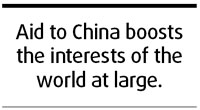A case for continued international help
Updated: 2008-02-22 07:30
Thanks to the continuous economic boom in recent decades, China is now able to offer more aid to developing countries, especially those in Africa.
Consequently, an opinion that is gaining increasing popularity in the international community is that China should no longer accept foreign aid as it has progressed beyond developing countries.

A German official said that China would soon replace Germany as the world's third biggest economy, so there was no reason to continue granting development aid.
A Canadian government member has also called for stopping the country's $60 million aid to China every year.
The Japanese government has decided not to make any new low-interest yen loans to China as part of its official development aid program this year. The reason being China has gone beyond a developing nation.
Meanwhile, many people in China also think the country is strong enough and it is unnecessary to seek international aid.
Whether or not China needs international aid should be decided on the real situation existing in the country.
China is still a developing country lagging far behind the developed ones in economic terms. The per capita GDP of China was barely more than $2,000 in 2006 while the average for developed countries was more than $40,000.
Although China has witnessed continuous economic growth in the last three decades, it still faces a lot of problems.
Moreover, there are several problems that can only be solved over time. These include desertification, environmental pollution, energy saving, and emission reduction.
With financial and technological assistance from other countries, China will be able to overcome these problems.
International aid has played a significant role in speeding up China's modernization. And it will continue to play a part in the country's current development.
After the People's Republic of China was founded in 1949, it was subject to political and economic boycotts. It was Chairman Mao Zedong's visit to the former Union of Soviet Socialist Republics (USSR) in 1950 that resulted in aid to the country. The 156 Soviet aid projects helped China lay a solid foundation in industry.
In the late 1970s, Chinese authorities introduced economic reform and opening up. Deng Xiaoping, the former leader, decided to seek international aid to lift the country out of a shortage of capital, advanced technology, and energy resources.
In 1979, the Japanese government offered aid to China, and has been the biggest donor since then.
The low-rate and long-term yen loans helped in infrastructure construction, trade growth, improvement of manufacturing technology, and progress in the lifestyle of the common people. Japanese aid to China plays a significant part in the friendly ties between the two countries.
As a matter of fact, aid by developed countries not only boosts the interests of China, but also the supplying countries and the world at large.
Most aid to China is no longer targeted at food shortages, but to boost mutual and global interests.
Japan has benefited by granting loans to China. Imports from Japan have increased and Japanese companies have a significant share in our domestic market.
When developed countries assist China in controlling green house gas emissions, improving energy efficiency, and making better use of renewable resources, it actually benefits the common interests of all people around the world.
Of course, China will stick to its own development principles whether it receives international aid or not. It did not compromise its sovereignty in the 1950s to win more aid from the Soviet Union, and it will never do so.
China is undertaking its responsibility by offering aid to other developing countries in return for what it has received.
China is not the major creditor of African countries and its loans to the continent are also limited. It should not be a reason for developed countries to stop aiding China just because it has extended its kindness to other developing countries in need of help.
The author is a former counselor of Chinese embassy in Ghana
(China Daily 02/22/2008 page8)
|
|
|
|
|
|